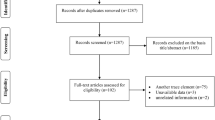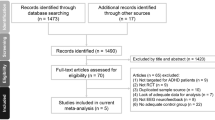Abstract
This study systematically reviews the randomized clinical trials examining the effect of zinc on attention-deficit hyperactivity disorder (ADHD), searching the PubMed/Medline and Scholar Google databases. All randomized controlled trials that examined zinc as the intervention, and ADHD as the primary outcome were included. Only three randomized controlled trials, one which included a community sample and two that included clinical samples, met inclusion criteria. The only trial that was well controlled and randomized according to the baseline zinc level showed that using zinc, either alone or in combination with stimulants, did not improve ADHD. Considering the lack of clear evidence for the effect of zinc on ADHD and the possible effect of zinc on the nervous system, more clinical studies are needed to prove or disprove the effect of zinc as a monotherapy or adjuvant therapy.
This is a preview of subscription content, access via your institution
Access options
Subscribe to this journal
Receive 12 print issues and online access
$259.00 per year
only $21.58 per issue
Buy this article
- Purchase on Springer Link
- Instant access to full article PDF
Prices may be subject to local taxes which are calculated during checkout
Similar content being viewed by others
References
Jacka FN, Maes M, Pasco JA, Williams LJ, Berk M . Nutrient intakes and the common mental disorders in women. J Affect Disord 2012; 141: 79–85.
Schmitt KC, Reith ME . The atypical stimulant and nootropic modafinil interacts with the dopamine transporter in a different manner than classical cocaine-like inhibitors. PLoS One 2011; 6: e25790.
Meinild AK, Sitte HH, Gether U . Zinc potentiates an uncoupled anion conductance associated with the dopamine transporter. J Biol Chem 2004; 279: 49671–49679.
Ghanizadeh A, Mohammadi MR, Moini R . Comorbidity of psychiatric disorders and parental psychiatric disorders in a sample of Iranian children with ADHD. J Atten Disord 2008; 12: 149–155.
Ghanizadeh A . Parents reported oral sensory sensitivity processing and food preference in ADHD. J Psychiatr Ment Health Nurs 2011; e-pub ahead of print 6 October 2011; doi: 10.1111/j.1365-2850.2011.01830.x.
Kordas K, Stoltzfus RJ, Lopez P, Rico JA, Rosado JL . Iron and zinc supplementation does not improve parent or teacher ratings of behavior in first grade Mexican children exposed to lead. J Pediatr 2005; 147: 632–639.
Liberati A, Altman DG, Tetzlaff J, Mulrow C, Gotzsche PC, Ioannidis JP et al. The PRISMA statement for reporting systematic reviews and meta-analyses of studies that evaluate health care interventions: explanation and elaboration. PLoS Med 2009; 6: e1000100.
Akhondzadeh S, Mohammadi MR, Khademi M . Zinc sulfate as an adjunct to methylphenidate for the treatment of attention deficit hyperactivity disorder in children: a double blind and randomized trial [ISRCTN64132371]. BMC Psychiatry 2004; 4: 9.
Arnold LE, Disilvestro RA, Bozzolo D, Bozzolo H, Crowl L, Fernandez S et al. Zinc for attention-deficit/hyperactivity disorder: placebo-controlled double-blind pilot trial alone and combined with amphetamine. J Child Adolesc Psychopharmacol 2011; 21: 1–19.
Bilici M, Yildirim F, Kandil S, Bekaroglu M, Yildirmis S, Deger O et al. Double-blind, placebo-controlled study of zinc sulfate in the treatment of attention deficit hyperactivity disorder. Prog Neuropsychopharmacol Biol Psychiatry 2004; 28: 181–190.
DiGirolamo AM, Ramirez-Zea M, Wang M, Flores-Ayala R, Martorell R, Neufeld LM et al. Randomized trial of the effect of zinc supplementation on the mental health of school-age children in Guatemala. Am J Clin Nutr 2010; 92: 1241–1250.
Ghanizadeh A . Overlap of ADHD and oppositional defiant disorder DSM-IV derived criteria. Arch Iran Med 2011; 14: 179–182.
Acknowledgements
We thank the research improvement center of Shiraz University of Medical Sciences and A Keivanshekouh for reviewing the manuscript.
Author information
Authors and Affiliations
Corresponding author
Ethics declarations
Competing interests
MB has received grant/research support from the National Institutes of Health, Cooperative Research Centre, Simons Autism Foundation, Cancer Council of Victoria, Stanley Medical Research Foundation, MBF, NHMRC, Beyond Blue, Rotary Health, Geelong Medical Research Foundation, Bristol Myers Squibb, Eli Lilly, Glaxo SmithKline, Meat and Livestock Board, Organon, Novartis, Mayne Pharma, Servier and Woolworths, has been a speaker for Astra Zeneca, Bristol Myers Squibb, Eli Lilly, Glaxo SmithKline, Janssen Cilag, Lundbeck, Merck, Pfizer, Sanofi Synthelabo, Servier, Solvay and Wyeth, and served as a consultant to Astra Zeneca, Bristol Myers Squibb, Eli Lilly, Glaxo SmithKline, Janssen Cilag, Lundbeck Merck and Servier. AG reports no conflict of interest.
Rights and permissions
About this article
Cite this article
Ghanizadeh, A., Berk, M. Zinc for treating of children and adolescents with attention-deficit hyperactivity disorder: a systematic review of randomized controlled clinical trials. Eur J Clin Nutr 67, 122–124 (2013). https://doi.org/10.1038/ejcn.2012.177
Received:
Revised:
Accepted:
Published:
Issue Date:
DOI: https://doi.org/10.1038/ejcn.2012.177
Keywords
This article is cited by
-
Zinc status in attention-deficit/hyperactivity disorder: a systematic review and meta-analysis of observational studies
Scientific Reports (2021)
-
ICP-MS Assessment of Hair Essential Trace Elements and Minerals in Russian Preschool and Primary School Children with Attention-Deficit/Hyperactivity Disorder (ADHD)
Biological Trace Element Research (2020)
-
Blood Levels of Trace Elements in Children with Attention-Deficit Hyperactivity Disorder: Results from a Case-Control Study
Biological Trace Element Research (2019)
-
Dietary and Micronutrient Treatments for Children with Neurodevelopment Disorders
Current Developmental Disorders Reports (2018)
-
Changed Plasma Levels of Zinc and Copper to Zinc Ratio and Their Possible Associations with Parent- and Teacher-Rated Symptoms in Children with Attention-Deficit Hyperactivity Disorder
Biological Trace Element Research (2016)



